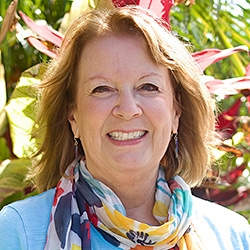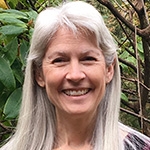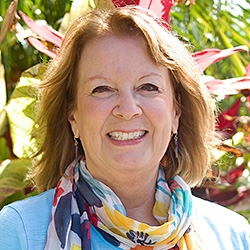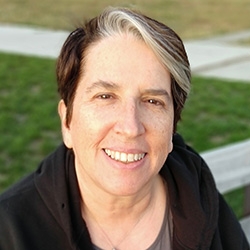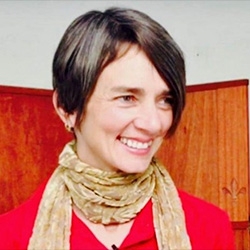

Search Results: freedom
-
CNVC Certified Trainer Miki Kashtan offers 3 steps we can take to access and express our deepest authentic expression.
-
When we have an inner conflict, how can we bring ourselves closer where we want to be? Miki explains about how we can deepen our self understanding in a way that can transform our own reactivity, urges, and false either/or views -- so that we can bring in more presence, choice, and options.
-
For this practice assume that reactivity is arising any time you are distracted and not enjoying something. Practice throughout the day by focusing your attention for a few moments on something specific that you find pleasing. Notice the sensation of joy or pleasure in your body, and hold attention there longer than usual. This interrupts tension and contraction. Keep remembering to do this. When you go too long without directing your attention in this way, the practice becomes less accessible.
-
As we head towards impending collapse the relative ease, comfort and freedom of the global north will be harder to maintain. Because of growing anxiety including from people with systemic power, we can anticipate increasing attempts at authoritarian control over the population. We can see what's occurring now as dry run practice for what's coming soon. What may help us: finding choice, knowing when to choose death, and walking towards community and life.
-
In the "obnoxious stage" we care for our needs in a way that doesn't respect others' needs. In the "emotional liberation" stage we fully care for others' needs as much as our own—while being free of fear, guilt, shame, or obligation. Often NVC training teaches us how to achieve the latter stage without the former. For greater compassion we can be more rigorous in how we talk about “responsibility", impacts and interdependence.
-
How can we mobilize this insight in support of our own and others' healing? These recordings will shed light on how the social context into which we are born affects our experience, and what we can do about it at the individual level within the paradigm of nonviolence.
-
Explore how social systems shape personal experience, and how nonviolence can support healing.
-
Trainer Tip: Mary shares an experience about accepting responsibility for her actions and how that lead her to greater choice and freedom.
-
Explore and embrace your true self in this gentle journey toward authentic self-love.
-
-
Trainer Tip: Instead of trying for perfection, let’s try safe experimentation: Acknowledge that whenever we try a new behavior, it’s bound to take us a few times before we get it right. Read on for how we can do this. We'll use learning empathy as an example.
-
- Learn concrete tools for engaging with others as you embrace individual and collective liberation
- Find your own source of choice even in the face of challenges
- Release the constriction of scarcity
- Find an empowered option to respond to what is happening in our world
- Open the door to the possibility of thriving rather than merely surviving
-
- Learn your body’s “language” and how to listen deeply to it
- Expand your NVC toolbox with emergency self-empathy tips
- Explore drawing on your senses to get past what is blocking you
- Discover and practice that “missing step” in the NVC process
-
- Explore what makes the capacity lens radical and practical
- Understand the complexities of how capacity and willingness interface
- Mourn capacity limits within and around us without jumping to conclusions
- Orient to agreements as behavioral anchoring in support of your commitments
-
When your dedication to something is fueled by a profound intention to benefit all life, you may call it your spiritual practice. This means cultivating compassion, wisdom, and skills to notice what truly serves life. Its a discovery and experiment in what does and doesn't serve life, and what you can do now - its not about what you believe or not. Continuously inquire: "What most deeply serves life and how can I do that right now?"
-
Observation is the awareness of our sensory perceptions and thoughts, separate from evaluations and judgments. Feeling involves bodily sensations and emotions, distinct from "faux feelings" that mix thought and emotion. Needs encompass universal human requirements for survival and wellness, while thoughts and evaluations express needs. Requests are rooted in connection and invite true willingness, rather than demanding compliance.
-
Learn Somatic Self-Empathy to manage yourself with clarity and compassion.
-
Observation is the awareness of our sensory perceptions and thoughts, separate from evaluations and judgments. Feeling involves bodily sensations and emotions, distinct from "faux feelings" that mix thought and emotion. Needs encompass universal human requirements for survival and wellness, while thoughts and evaluations express needs. Requests are rooted in connection and invite true willingness, rather than demanding compliance.
-
Distinguishing between needs and strategies to meet needs is crucial for solving conflict. For example, the need for peace can be met through various strategies beyond solitude or gratitude. Similarly, sex is a strategy. Sexual expression is the need behind it, and can be met in various ways to meet that need without having sex itself. Such flexibility can foster creativity and deeper connection, enhancing relationships.
-
- 3 full-length courses to deepen your empathy practice
- Learn your body’s “language” and how to listen deeply to it
- Quickly reconnect and return to empathic presence when you are triggered
- Enhance your listening skills and experience greater ease and joy in all your interactions
Quick Links

Stay in Touch!
We value your privacy, won't share your email address and you can easily unsubscribe any time.








